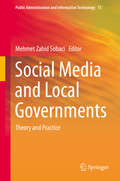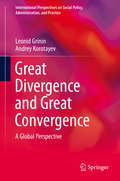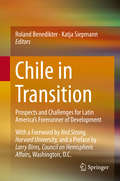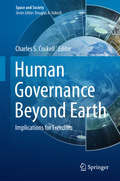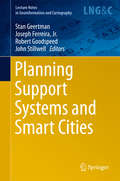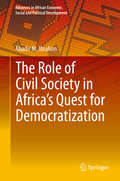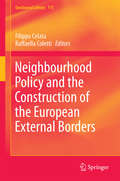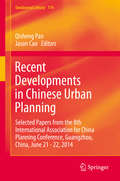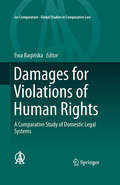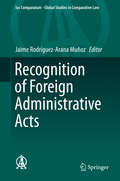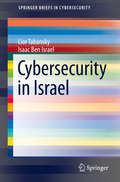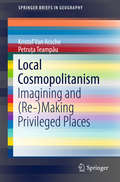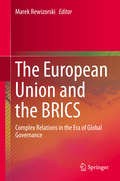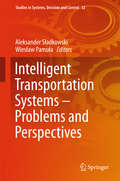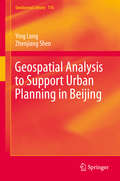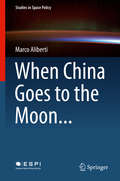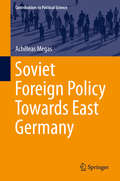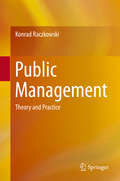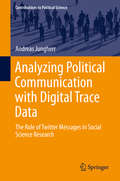- Table View
- List View
Social Media and Local Governments
by Mehmet Zahid SobaciToday, social media have attracted the attention of political actors and administrative institutions to inform citizens as a prerequisite of open and transparent administration, deliver public services, contact stakeholders, revitalize democracy, encourage the cross-agency cooperation, and contribute to knowledge management. In this context, the social media tools can contribute to the emergence of citizen-oriented, open, transparent and participatory public administration. Taking advantage of the opportunities offered by social media is not limited to central government. Local governments deploy internet-based innovative technologies that complement traditional methods in implementing different functions. This book focuses on the relationship between the local governments and social media, deals with the change that social media have caused in the organization, understanding of service provision, performance of local governments and in the relationships between local governments and their partners, and aims to advance our theoretical and empirical understanding of the growing use of social media by local governments. This book will be of interest to researchers and students in e-government, public administration, political science, communication, information science, and social media. Government officials and public managers will also find practical use recommendations for social media in several aspects of local governance
Great Divergence and Great Convergence
by Leonid Grinin Andrey KorotayevThis new monograph provides a stimulating new take on hotly contested topics in world modernization and the globalizing economy. It begins by situating what is called the Great Divergence--the social/technological revolution that led European nations to outpace the early dominance of Asia--in historical context over centuries. This is contrasted with an equally powerful Great Convergence, the recent economic and technological expansion taking place in Third World nations and characterized by narrowing inequity among nations. They are seen here as two phases of an inevitable global process, centuries in the making, with the potential for both positive and negative results. This sophisticated presentation examines: Why the developing world is growing more rapidly than the developed world. How this development began occurring under the Western world's radar. How former colonies of major powers grew to drive the world's economy. Why so many Western economists have been slow to recognize the Great Convergence. The increasing risk of geopolitical instability. Why the world is likely to find itself without an absolute leader after the end of the American hegemony A work of rare scope, Great Divergence and Great Convergence gives sociologists, global economists, demographers, and global historians a deeper understanding of the broader movement of social and economic history, combined with a long view of history as it is currently being made; it also offers some thrilling forecasts for global development in the forthcoming decades.
German-Sino Business Networks
by Alexander HäntzschelIn this book, Alexander Häntzschel presents the benefits of organized networks and provides a first-ever overview of German-Sino business networks. Based on more than 20 expert interviews and research of 30 different cases, the analysis covers the different forms of organization, their target groups and members, services and activities, and accessibility and membership fees. Complementary to the analysis, the results of a survey bring forward the experiences and expectations of professionals involved in such networks. With this Springer Brief, business professionals get a quick and useful overview of the leading networks such as the German Asia-Pacific Business Association, the German-Chinese Business Association, and the Asian Social Business Community.
Chile in Transition: Prospects and Challenges for Latin America’s Forerunner of Development
by Roland Benedikter Katja SiepmannThe economic, political and social situation in Chile shows a country in transition. Some observers anticipate a broad "reboot" of the nation. While Chile is still seen by many as an example of progress in South America and of developmental potential in the global South, it faces a complex political constellation, particularly in the aftermath of the re-election of Michelle Bachelet. Many wonder how social and institutional innovations can be incepted without interrupting the country's remarkable success over the past decades. This book provides an interdisciplinary analysis of Chile's situation and perspectives. In particular, it addresses the questions: What is Chile's real socio-political situation behind the curtains, irrespective of simplifications? What are the nation's main opportunities and problems? What future strategies will be concretely applicable to improve social balance and mitigate ideological divisions? The result is a provocative examination of a nation in search of identity and its role on the global stage. Roland Benedikter, Dr. Dr. Dr. , is Research Scholar at the Orfalea Center for Global and International Studies, University of California, Santa Barbara, Senior Research Scholar of the Council on Hemispheric Affairs Washington D. C. , Trustee of the Toynbee Prize Foundation Boston and Full Member of the Club of Rome. Katja Siepmann, MA, is Senior Research Fellow of the Counc il on Hemispheric Affairs Washington D. C. , Member of the German Council on Foreign Relations, and Lecturer at the Faculty of Interdisciplinary Cultural Sciences of the European University Frankfurt/Oder. The volume features a Foreword by Ned Strong, Executive Director of the David Rockefeller Center for Latin American Studies, Harvard University, and a Preface by Larry Birns, Director of the Council on Hemispheric Affairs, Washington D. C. , and Former Senior Public Affairs Officer of the United Nations' Economic Commission for Latin America (Santiago, Chile).
Human Governance Beyond Earth
by Charles S. CockellThis book extends the discussion of the nature of freedom and what it means for a human to be free. This question has occupied the minds of thinkers since the Enlightenment. However, without exception, every one of these discussions has focused on the character of liberty on Earth. In this volume the authors explore how people are likely to be governed in space and how that will affect what sort of liberty they experience. Who will control oxygen? How will people maximise freedom of movement in a lethal environment? What sort of political and economic systems can be created in places that will be inherently isolated? These are just a few of the major questions that bear on the topic of extra-terrestrial liberty. During the last forty years an increasing number of nations have developed the capability of launching people into space. The USA, Europe, Russia, China and soon India have human space exploration programs. These developments raise the fundamental question of how are humans to be governed in space. This book follows from a previous volume published in this series which looked at the Meaning of Liberty Beyond the Earth and explored what sort of freedoms could exist in space in a very general way. This new volume focuses on systems of governance and how they will influence which of these sorts of freedoms will become dominant in extra-terrestrial society. The book targets a wide readership covers many groups including: Space policy makers interested in understanding how societies will develop in space and what the policy implications might be for space organisations. Space engineers interested in understanding how social developments in space might influence the way in which infrastructure and space settlements should be designed. Space scientists interested in how scientific developments might influence the social structures of settlements beyond the Earth. Social scientists (political philosophers, ethicists etc) interested in understanding how societies will develop in the future.
Planning Support Systems and Smart Cities
by Jr. John Stillwell Stan Geertman Joseph Ferreira Robert GoodspeedThis book is a selection of the best and peer-reviewed articles presented at the CUPUM (Computers in Urban Planning and Urban Management) conference, held in the second week of July 2015 at MIT in Boston, USA. The contributions provide state-of the art overview of the availability and application of Planning Support Systems (PSS) in the framework of Smart Cities.
The Role of Civil Society in Africa’s Quest for Democratization
by Abadir M. IbrahimThis book tests many of the assumptions, hypotheses, and conclusions connected with the presumed role of civil society organizations in the democratization of African countries. Taking a comparative approach, it looks at countries that have successfully democratized, those that are stuck between progress and regression, those that have regressed into dictatorship, and those that are currently in transitional flux and evaluates what role, if any, civil society has played in each instance. The countries discussed--South Africa, Ghana, Nigeria, Ethiopia, Egypt and Tunisia--represent a diverse set of social and political circumstances and different levels of democratic achievement, providing a rich set of case studies. Each sample state also offers an internal comparison, as each has historically experienced different stages of democratization. Along the course of each case study, the book also considers the effect that other traditionally studied factors, such as culture, colonization, economic development and foreign aid, may have had on individual attempts at democratization. The first extensive work on civil society and democratization in Africa, the book adds new insights to the applicability of democratization theory in a non-Western context, both filling a gap in and adding to the existing universal scholarship. This book will be useful for scholars of political science, economics, sociology and African studies, as well as human rights activists and policy makers in the relevant geographical areas.
Neighbourhood Policy and the Construction of the European External Borders
by Filippo Celata Raffaella ColettiThis book looks both backward and forward with regard to the European Union's political strategies towards its neighbouring countries. By bringing together the perspectives of critical geopolitics, policy studies and border studies, it presents a comprehensive review of the European Neighbourhood Policy and how it impacts the ongoing construction of the EU's external frontiers. Is the EU committed to promoting integration in a 'wider' European space, or is a "fortress Europe" emerging where the strengthening of internal cohesion is coupled with the militarisation of its external borders? The book aims to problematize this question by showing how the EU's external policies are based on a mixture of openness and closure, inclusion and exclusion, cooperation and securitisation. The European Neighbourhood Policy is a controversial strategy where regionalization and bordering, homogenisations and differentiations, centrifugal and centripetal forces proceed side-by-side, in an explicit attempt to construct a selective, mobile and fragmented border. A specific focus is devoted to the diversity of geo-strategies the EU is pursuing in its neighbouring countries and regions, macro-regional strategies and cross-border cooperation initiatives as new scales of cooperation, and the role of other global players.
Recent Developments in Chinese Urban Planning
by Qisheng Pan Jason CaoThis book provides a comprehensive overview of the most recent development of Chinese cities. It discusses a broad range of subjects of urban planning, including environmental planning, transportation planning, historical preservation, economic development, geographic information systems (GIS) and other technological applications. China, the most populous country in the world, has experienced unprecedented urbanization in a relatively short period. During the past decades, urbanization in China has centered on land development through industrialization and investment, but it has largely ignored the prosperity and well-being of the people. Livable cities are not just those with magnificent buildings and infrastructure; they are great places where people want to live. China's recently inaugurated leaders have proposed a new model to actively and prudently enhance the quality of urbanization through compact, intelligent, and low-carbon development. It symbolizes the departure from land-centered urban development to a form of people-oriented urbanization, as China's Premier, Li Keqiang, has advocated. This new model offers a platform for planning researchers and practitioners to tackle urbanization challenges, such as social equity, environment, energy, ecological and historic preservation, affordable housing, and externalities of mega cities. Furthermore, people-oriented urbanization calls for public participation and stakeholder engagement in the planning process. This book brings together planners, designers, scholars, scientists, and government officials from China and all over the world to exchange ideas on urban regeneration.
Recent Developments in Chinese Urban Planning: Selected Papers from the 8th International Association for China Planning Conference, Guangzhou, China, June 21 - 22, 2014 (GeoJournal Library #114)
by Qisheng Pan Jason CaoThis book provides a comprehensive overview of the most recent development of Chinese cities. It discusses a broad range of subjects of urban planning, including environmental planning, transportation planning, historical preservation, economic development, geographic information systems (GIS) and other technological applications. China, the most populous country in the world, has experienced unprecedented urbanization in a relatively short period. During the past decades, urbanization in China has centered on land development through industrialization and investment, but it has largely ignored the prosperity and well-being of the people. Livable cities are not just those with magnificent buildings and infrastructure; they are great places where people want to live. China’s recently inaugurated leaders have proposed a new model to actively and prudently enhance the quality of urbanization through compact, intelligent, and low-carbon development. It symbolizes the departure from land-centered urban development to a form of people-oriented urbanization, as China’s Premier, Li Keqiang, has advocated. This new model offers a platform for planning researchers and practitioners to tackle urbanization challenges, such as social equity, environment, energy, ecological and historic preservation, affordable housing, and externalities of mega cities. Furthermore, people-oriented urbanization calls for public participation and stakeholder engagement in the planning process. This book brings together planners, designers, scholars, scientists, and government officials from China and all over the world to exchange ideas on urban regeneration.
Damages for Violations of Human Rights: A Comparative Study of Domestic Legal Systems (Ius Comparatum - Global Studies in Comparative Law #9)
by Ewa BagińskaThis volume analyses the legal grounds, premises and extent of pecuniary compensation for violations of human rights in national legal systems. The scope of comparison includes liability regimes in general and in detail, the correlation between pecuniary remedies available under international law and under domestic law, and special (alternative) compensation systems. All sources of human rights violations are embraced, including historical injustices and systematical and gross violations. The book is a collection of nineteen contributions written by public international law, international human rights and private law experts, covering fifteen European jurisdictions (including Central and Eastern Europe), the United States, Israel and EU law. The contributions, initially prepared for the 19th International Congress of Comparative law in Vienna (2014), present the latest developments in legislation, scholarship and case-law concerning domestic causes of action in cases of human rights abuses. The book concludes with a comparative report which assesses the developments in tort law and public liability law, the role of the constitutionalisation of the right to damages as well as the court practice related to the process of enforcement of human rights through monetary remedies. This country-by-country comparison allows to consider whether the value of protection of human rights as expressed in international treaties, ius cogens and in national constitutional laws justifies the conclusion that the interests at stake should enjoy protection under the existing civil liability rules, or that a new cause of action, or even a whole new set of rules, should be created in national systems.
Recognition of Foreign Administrative Acts
by Jaime Rodríguez-Arana MuñozThis book presents an analysis of the concept of the administrative act and its classification as 'foreign', and studies the administrative procedure for adopting administrative acts in a range of countries in and outside Europe. While focusing on the recognition and execution of foreign administrative acts, the book examines the validity, efficacy and enforceability of foreign administrative acts at national level. The book starts with a general analysis of the issue, offering general conclusions about the experiences in different countries. It then analyses the aforementioned themes from the perspective of the domestic law of different European nations and a number of international organisations (European Union, MERCOSUR, and Andean Community). In addition, the book studies the role of the European Union in the progress towards the recognition and execution of foreign administrative acts, where the principle of mutual recognition plays a vital part. Finally, the book analyses the international conventions on the recognition and execution of administrative acts and on the legalisation of public documents.
Cybersecurity in Israel (SpringerBriefs in Cybersecurity)
by Lior Tabansky Isaac Ben IsraelThis SpringerBrief gives the reader a detailed account of how cybersecurity in Israel has evolved over the past two decades. The formation of the regions cybersecurity strategy is explored and an in-depth analysis of key developments in cybersecurity policy is provided. The authors examine cybersecurity from an integrative national perspective and see it as a set of policies and actions with two interconnected goals: to mitigate security risks and increase resilience and leverage opportunities enabled by cyber-space. Chapters include an insight into the planning and implementation of the National Security Concept strategy which facilitated the Critical Infrastructure Protection (CIP) agreement in 2002, (one of the first of its kind), the foundation of the Israeli Cyber-strategy in 2011, and details of the current steps being taken to establish a National Cyber Security Authority (NCSA). Cybersecurity in Israel will be essential reading for anybody interested in cyber-security policy, including students, researchers, analysts and policy makers alike.
Local Cosmopolitanism
by Kristof Van Assche Petruţa TeampăuThis book offers a unique perspective on cosmopolitanism, examining the ways it is constructed and reconstructed on the small scale in an ongoing process of matching the local with the global, a process entailing mutual transformation. Based on a wide range of literatures and a series of case studies, it analyzes the different versions and functions of cosmopolitanism and points to the need to critically re-examine current conceptions of globalization. The book first illustrates the interplay between networks and narratives in the construction of cosmopolitan communities in three specific cities: Trieste, Odessa and Tbilisi. Each has a past more cosmopolitan than the present and each uses that cosmopolitan past to guide them towards the future. Next, the book focuses on narrative dynamics by isolating several discourses on the cosmopolitan place and figure in European cultural history. It then goes on to detail the internal representations and local functions of larger wholes in smaller communities, shedding a new light on issues of inter- disciplinary interest: self- governance, participation, local knowledge, social memory, scale, planning and development. Of interest to political scientists, anthropologists, economists, geographers and philosophers, this book offers an insightful contribution to theories of globalization and global/ local interaction, bringing the local discursive mechanics into sharper focus and also emphasizing the semi- autonomous character of narrative constructions of self and community in a larger world.
From Cold War to Cyber War
by Pierre Thielbörger Hans-Joachim HeintzeThis book follows the history of the international law of peace and armed conflict over the last 25 years. It highlights both the parameters that have remained the same over the years as well as the new challenges now facing international law. The articles analyze new developments concerning the prohibition of the use of force in international relations, self-determination of peoples, human rights and human security as well as international coordination of humanitarian assistance.
The European Union and the BRICS
by Marek RewizorskiThis book explores the relations between the EU and the BRICS in the areas of politics, economic development, trade and security. The contributions cover topics such as the position of the EU and BRICS in the global order and the EU as a "normative power," as well as the evolution, characteristics and institutionalization of BRICS and the roles of its member countries Brazil, Russia, India, China, South Africa. The book will appeal to researchers and scholars interested in the rise of BRICS and the resulting challenges and opportunities for the European Union and Global Governance.
Intelligent Transportation Systems - Problems and Perspectives
by Aleksander Sładkowski Wiesław PamułaThis book presents a discussion of problems encountered in the deployment of Intelligent Transport Systems (ITS). It puts emphasis on the early tasks of designing and proofing the concept of integration of technologies in Intelligent Transport Systems. In its first part the book concentrates on the design problems of urban ITS. The second part of the book features case studies representative for the different modes of transport. These are freight transport, rail transport and aerospace transport encompassing also space stations. The book provides ideas for deployment which may be developed by scientists and engineers engaged in the design of Intelligent Transport Systems. It can also be used in the training of specialists, students and post-graduate students in universities and transport high schools.
Geospatial Analysis to Support Urban Planning in Beijing
by Ying Long Zhenjiang ShenThis book describes a comprehensive framework of novel simulation approaches, conventional urban models, and related data mining techniques that will help develop planning support systems in Beijing as well as other mega-metropolitan areas. It investigates the relationships between human behaviors and spatial patterns in order to simulate activities in an urban space, visualize planning alternatives, and support decision making. The book first explains urban space using geometric patterns, such as points, networks, and polygons, that help identify patterns of household and individual human behavior. Next, it details how novel simulation methodologies, such as cellular automaton and multi-agent systems, and conventional urban modeling, such as spatial interaction models, can be used to identify an optimal or a simulated solution for a better urban form. The book develops a comprehensive land use and transportation integrated model used to explore the spatial patterns of mutual interaction between human mobility and urban space. This model can help forecast the distribution of different types of households, rent prices, and land prices, as well as the distribution of routes and traffic volume based on an appraisal of labor demand and supply. This book shows how geospatial analysis can be a useful tool for planners and decision makers to help in ascertaining patterns of activities and support urban planning. Offering both novel and conventional approaches to urban modeling, it will appeal to researchers, students, and policy makers looking for the optimal way to plan the d evelopment of a mega-metropolitan area.
When China Goes to the Moon...
by Marco AlibertiThis book is about China's ambitions in its most complex and internationally visible space endeavor, namely its human space exploration programme. It provides a comprehensive reflection on China´s strategic direction and objectives in space, including in particular those set forth in its human spaceflight programme and analyses the key domestic and external factors affecting the country's presumed manned lunar ambitions. The objective of the book is to disentangle the opportunities and challenges China´s space ambitions are creating for other spacefaring nations and for Europe in particular. It therefore includes an in-depth analysis of possible European postures towards China in space exploration and seeks to stimulate a debate on future space strategies in the broader context of world politics.
Globalisation, Ideology and Politics of Education Reforms
by Joseph ZajdaThis 14th volume in the 24-volume book series sets out to explore the interrelationship between ideology, the state, and education reforms, placing it in a global context. It examines some of the major education reforms and policy issues in a global culture, particularly in the light of recent shifts in accountability, quality and standards-driven education, and policy research. By doing so, it provides a comprehensive picture of the intersecting and diverse discourses of globalisation and policy-driven reforms in education. The book draws upon recent studies in the areas of globalisation, equality, and the role of the state. It explores conceptual frameworks and methodological approaches applicable in the research covering the state, globalisation, and education reforms. It critiques the neo-liberal ideological imperatives of current education and policy reforms, and illustrates the way that shifts in the relationship between the state and education policy affect current trends in education reforms and schooling globally. Individual chapters critically assess the dominant discourses and debates on education and policy reforms. Using diverse comparative education paradigms from critical theory to historical-comparative research, the chapters focus on globalisation, ideology and democracy and examine both the reasons and outcomes of education reforms and policy change. They provide an informed critique of models of accountability, quality and standards-driven education reforms that are informed by Western dominant ideologies and social values. The book also draws upon recent studies in the areas of equity, cultural capital and dominant ideologies in education.
Soviet Foreign Policy Towards East Germany
by Achilleas MegasThis book examines Soviet Foreign Policy towards East Germany in the late 1980s. By focusing on the complex interaction between domestic political thought and developments in the international system, the author illustrates the hierarchical relationship between the GDR and the USSR and offers different perspectives for understanding Soviet foreign policy. The books demonstrates that shifts in Soviet policy towards the GDR stemmed, on the one hand, from the international level, in that Soviet security was legitimated by the existence of two full-fledged German states, and, on the other, may be best explained in terms of ideas and Gorbachev's new political philosophy.
Heritage, Pilgrimage and the Camino to Finisterre
by Cristina Sánchez-CarreteroThis book presents research concerning the effects of the Camino to Finisterre on the daily lives of the populations who live along the route, and the heritagization processes that exploitation of the Camino for tourism purposes involves. Rather than focusing on the route to Santiago de Compostela and the pilgrimage itself, it instead examines a peculiar part of the route, the Camino to Finisterre, employing multiple perspectives that consider the processes of heritagization, the effects of the pilgrimage on local communities, and the motivations of the pilgrims. The book is based on a three-year research project and is the result of a multidisciplinary collaboration between anthropologists, sociologists, historians and archaeologists. Instead of ending in Santiago, as the rest of the Caminos do, this route continues to the cape of Finisterre on the Galician Atlantic coast. This part of the Camino de Santiago is not officially recognized by the Catholic Church and does not count as part of reaching Compostela, the recognition granted by the Catholic Church to those pilgrims who have walked at least 100 km. For this reason, as well as its relationship with the sun cult, many pilgrims call this route "the Camino of the atheists. " In fact, the Catholic Church is a strong force for the heritagization of the rest of the Caminos, and maintains a clear ignoratio strategy concerning the Finisterre route: Officially, the church neither opposes nor recognizes this route.
Finding Solutions for Protecting and Sharing Archaeological Heritage Resources
by Anne P. Underhill Lucy C. SalazarThis volume provides case studies about successful strategies employed in diverse world areas for the protection of archaeological heritage resources. Some chapters focus on a search for solutions arrived at by diverse groups of people working in specific areas rather than simply describing loss of cultural heritage. Other chapters provide a long-term view of intensified efforts at protection of archaeological resources. The authors describe challenges and solutions derived by concerned people in eastern Asia (China, Japan, Thailand), West Africa, Easter Island, Jordan, Honduras and more than one area of Peru. All of the authors draw upon deep, personal involvement with the protection of cultural heritage in each area. This volume is a timely addition to a growing number of conferences and publications about the management of cultural heritage--both archaeological and historical.
Public Management
by Konrad RaczkowskiPublic management is undoubtedly an acknowledged area of management science, but with meager empirical research. This book takes this challenge and presents a rare analysis of public management from the perspective of 12 Prime Ministers of Poland who governed between 1989 and 2014. The author features the concepts, practice and challenges of public management by making use of direct interviews with the Prime Ministers according to the classical management functions of planning, organization, direction and controlling. The book also presents a theoretical inquiry which redefines public management by breaking away from the traditional paradigm of public management, and introducing a 'mega-organizational' understanding of the state within new institutional economics.
Analyzing Political Communication with Digital Trace Data: The Role of Twitter Messages in Social Science Research (Contributions to Political Science)
by Andreas JungherrThis book offers a framework for the analysis of political communication in election campaigns based on digital trace data that documents political behavior, interests and opinions. The author investigates the data-generating processes leading users to interact with digital services in politically relevant contexts. These interactions produce digital traces, which in turn can be analyzed to draw inferences on political events or the phenomena that give rise to them. Various factors mediate the image of political reality emerging from digital trace data, such as the users of digital services' political interests, attitudes or attention to politics. In order to arrive at valid inferences about the political reality on the basis of digital trace data, these mediating factors have to be accounted for. The author presents this interpretative framework in a detailed analysis of Twitter messages referring to politics in the context of the 2009 federal elections in Germany. This book will appeal to scholars interested in the field of political communication, as well as practitioners active in the political arena.
